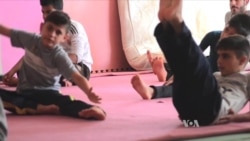The Iraqi city of Kirkuk may be under tight security in the wake of Islamic State bombing earlier this year, but its youth refuse to let that get in the way of embracing the free-spirited fun of parkour.
A growing numbers of children and teenagers are flocking to a local youth center here to learn the basics of parkour, or freerunning, a French-born pastime that mixes gymnastics with urban exploration. Even children of refugees who are being hosted in Kirkuk are getting into the act.
YouTube inspiration
At the heart of the sport’s recent popularity in Iraq are two friends inspired by a YouTube video.
It was only after seeing District B13, a film featuring one of parkour’s French founders David Belle, that Ari Star and Huner Sherzad Ameen realized others shared a passion they embraced growing up.
“I had been trying to do parkour before — it was like my own sport — but I didn’t know it had a name,” explained 21-year-old Star.
Being the first freerunners in a region riven by political tension, even before the threat of Islamic State group, wasn’t always easy.
“At first we did it in the local park, but were asked to leave by the security forces because of the security situation,” Star said.
Undeterred, last year they set up classes at a government-run youth center in the city, offering free lessons every day.
Safe haven
Since then, tensions have grown in Kirkuk.
Peshmerga forces repelled the advances of Islamic State after the withdrawal of Iraqi forces, but could not prevent bombings in the city in late 2014 and early 2015.
Despite the unrest, interest in parkour has continued to build.
Offering a safe environment to learn in, the daily sessions now attract up to 60 youths who sometimes get to put their skills to the test in a historic setting — Kirkuk’s ancient Citadel.
For 14-year-old Mohammed Ahmed, who had been bodybuilding at the leisure center, parkour offered an irresistible lure.
“I find the exercise joyful,” said Ahmed, a Kirkuk native who barely broke a sweat performing a series of spectacular flips along the safety mat-padded floor just seconds earlier.
“The teachers are good and the equipment is good too,” he said, adding that he has made a lot of new friends through the sport.
Joining Ahmed are fellow youth who've come to the city not by choice, but circumstance.
Star says some classes even attracted a group of children whose families fled Islamic State violence. For these youngsters, most of whom came from Tikrit, he hopes parkour can play some small role in the reconstruction of their disrupted lives.
"We have two aims with teaching them,” Star said. “The first is to help them forget what happened. The second is to show them how they could be a professional at parkour.”
While the elite world of professional parkour may be a distant dream for these youth, the immediate benefits appear to be worth it. Even the youth center manager, Dyar Abdulkhaliq Nasraddin — himself a recent parkour convert — says the activity keeps youngsters out danger.
“We are able to gather people daily and keep them from the hostility outdoors,” he said. “It keeps them from the bad things that are happening outside. For example, it prevents them from handling guns.”
“It’s not a sport about war, or fighting,” added Ari’s friend Huner, a 19-year-old with the toned physique and prowess of a gymnast. “It’s different in that you play it for yourself, and there are no obstacles to stop you playing. Your body becomes fitter, and you can use this sport everywhere.”
And with the old remains of Kirkuk’s Citadel already a prestigious playground for this most recent of pastimes, Ari hopes that parkour can find a firm foothold in the region.
“God willing it will grow, and in one or two years I think it will progress so much,” he said, adding that he wanted establish official competitions and clubs for the sport.
Young Mohammed, meanwhile, was even more confident that parkour will catch on.
“This sport is going to spread all over Kurdistan and Iraq,” he said before heading off to take another leap across the safety mat.
Joseph Ataman contributed to this report.





